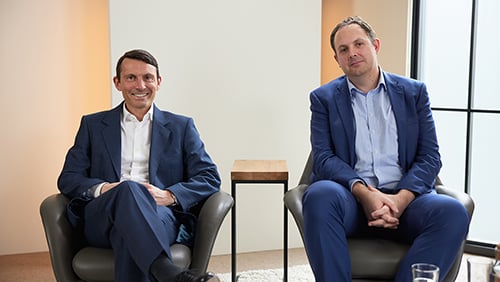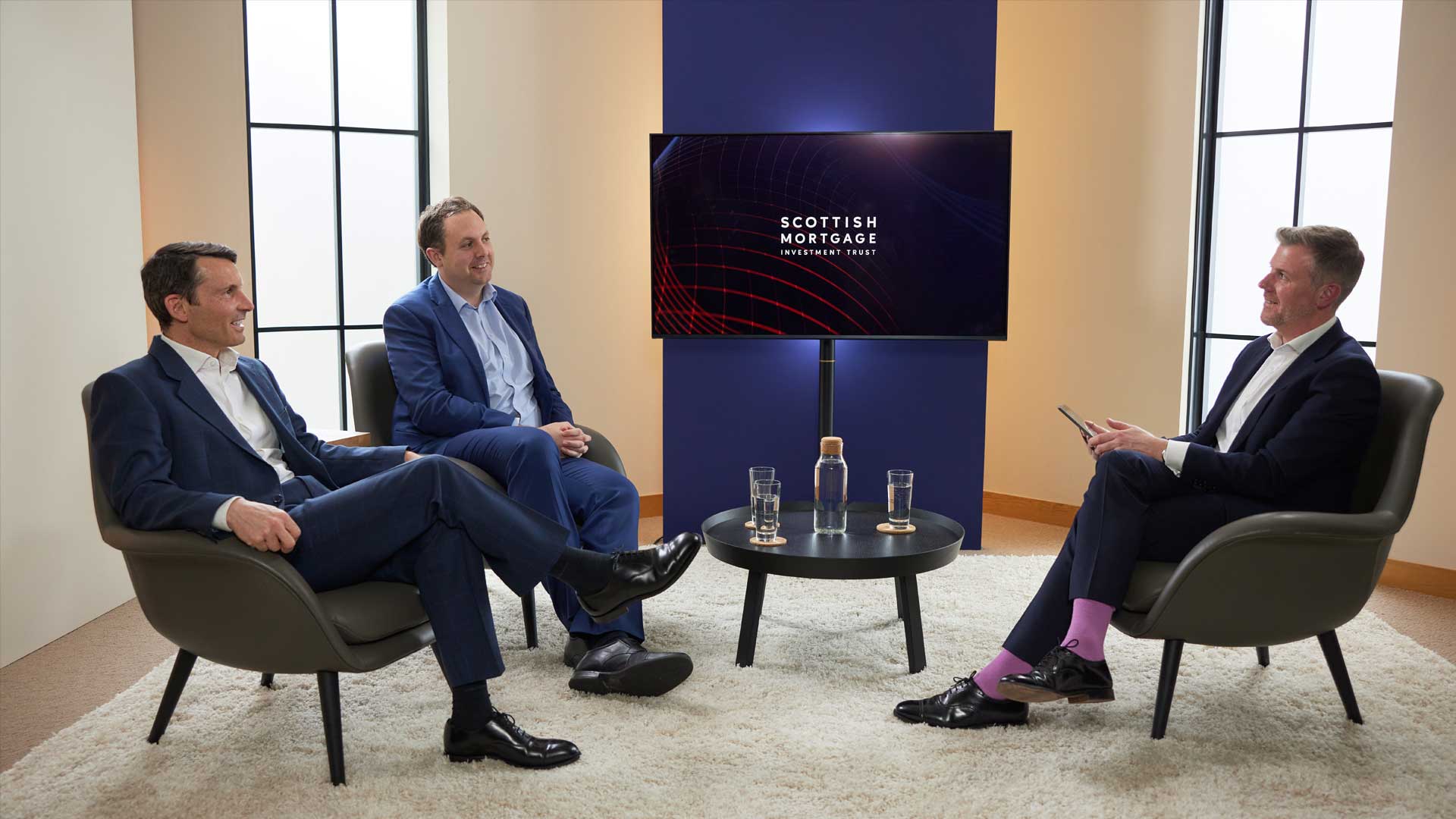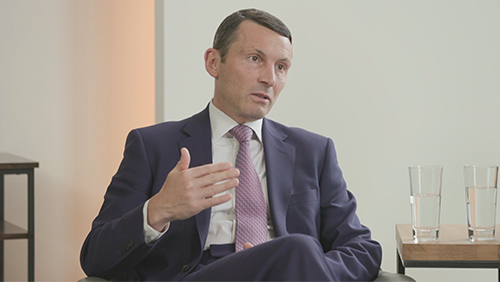July 2021
Article
Embracing the extraordinary
The Scottish Mortgage Team
Building long-term value is not about following the pack, but about spotting the companies set to benefit from social change, according to Scottish Mortgage’s managers. This short article provides an overview of this idea, and other topics discussed in a recent webinar with investment specialist Claire Shaw and Scottish Mortgage Managers James Anderson, Lawrence Burns and Tom Slater.

The value of any investment can fall as well as rise and investors may not get back the amount invested.
His company saved countless lives with a Covid-19 vaccine that taught the body how to produce an immune response. Moderna chairman and co-founder Noubar Afeyan, therefore speaks with authority when he says:
“We have to be willing to embrace unreasonable propositions and unreasonable people in order to make extraordinary findings because the notion that utterly reasonable people doing utterly reasonable things will produce massive breakthroughs doesn’t compute.”
That link between embracing the unreasonable and achieving extraordinary breakthroughs is at the heart of joint managers James Anderson and Tom Slater’s stewardship of Scottish Mortgage. In his first webinar for the trust since announcing he will be stepping down next year, James was joined at the 17 June online event by Tom and new deputy manager Lawrence Burns.
The managers explained how the pursuit of extreme growth required them to be radical and unconventional. That means investing for the long term and sticking with extraordinary companies and their extraordinary managers even during share price dips.
“All companies – even great companies – go through these periods,” explained Lawrence. “That shows the importance of keeping a long-term mindset and continually being focused on the five-to-ten-year possibilities. The greatest cost to our shareholders is giving up on these extraordinary companies, because they’re what offer the really huge returns and they’re worth backing through these difficult periods.”

Lawrence pointed to Tesla, one of Scottish Mortgage’s highest-profile investments of recent years, highlighting how the trust had stood by the electric carmaker. James added: “Of course, we’re in no way claiming that Tesla’s success is because of us, but it’s somewhat shattering to remember that we were – for quite a long period – the only major institutional shareholder.”
Part of the investment case for Tesla was based on recognising its potential for impact. “The number of companies that can make a real difference to society is tiny,” according to James.
That outlook underpins the trust’s view of companies’ wider responsibilities. “We’ve always seen that as something not separate from investment,” said Lawrence. Businesses don’t operate in a vacuum, and so the managers try to understand companies’ interactions with society. “That’s a responsibility of the financial markets – to make sure we’re supporting companies to develop and improve our society in the long run”.
Tesla isn’t the only stock in the energy sector that’s caught the managers’ eyes. “We’re underestimating the sheer scale and benefit of what is going on in the energy world,” James asserted. He highlighted battery maker Northvolt and electric vehicle charging network operator ChargePoint, two portfolio companies that will benefit from the shift to a low-carbon economy.
While digital technology is revolutionising the energy sector through the creation of smart electricity grids to balance demand, the managers also highlighted its effect on the healthcare market. Digital technology is being harnessed by biotech companies including Moderna and Ginkgo Bioworks who aim to make biology easier to engineer by building a platform which makes cells as easy to programme as computers.

“It may mean that early leadership locks you into dominance for years to come. What applies to digital internet businesses may apply to these absolutely critical areas,” James suggested.
The convergence of digital technology and healthcare also excites Lawrence. “The big context is taking things such as Moore’s Law [which states computer chip power doubles every two years while halving in cost] and data – which have been so transformative in retail and advertising and then applying it to biology and healthcare,” he explained.
Ginkgo’s forthcoming initial public offering (IPO) on the New York Stock Exchange underlines Scottish Mortgage’s willingness to invest in both publicly-listed and privately-owned companies. But founders need to understand the change in ownership structure and accountability that goes with joining a stock market. “In the case of Ginkgo, we had a frank conversation with the founder, Jason Kelly, about his expectations of this process,” said Tom. “We were happy to back him in going down that route.”
Scottish Mortgage, Lawrence added, looks at public and private companies on a case-by-case basis. “One of our advantages is that we’re completely agnostic whether they IPO in one year, five years or ten years,” he concluded. “The only thing we really care about is what’s best for the long-term business to deliver that outcome for shareholders.”
Another thing that matters to the managers is the need to embrace extraordinary companies in pursuit of long-term returns.
To watch the full webinar and find out more about Lawrence, James and Tom’s thoughts on embracing extraordinary companies, please click here.
Risk Factors
The specific risks associated with the funds include:
- The Trust invests in overseas securities. Changes in the rates of exchange may also cause the value of your investment (and any income it may pay) to go down or up.
- The Trust invests in emerging markets where difficulties in dealing, settlement and custody could arise, resulting in a negative impact on the value of your investment.
- The Trust can borrow money to make further investments (sometimes known as “gearing” or “leverage”). The risk is that when this money is repaid by the Trust, the value of the investments may not be enough to cover the borrowing and interest costs, and the Trust will make a loss. If the Trust's investments fall in value, any invested borrowings will increase the amount of this loss.
- The Trust has significant exposure to private companies. The Trust’s risk could be increased as these assets may be more difficult to buy or sell, so changes in their prices may be greater.
- The Trust can make use of derivatives. The use of derivatives may impact performance.
Scottish Mortgage Annual Past Performance
| 2015 | 2016 | 2017 | 2018 | 2019 |
| 29.6% | -0.7% | 40.9% | 21.6% | 16.5% |
Source: Morningstar, share price, total return.
Past performance is not a guide to future returns.
About the author - The Scottish Mortgage Team
The Scottish Mortgage team are dedicated to servicing existing and prospective shareholders of the trust.
Important information
This communication was produced and approved at the time stated and may not have been updated subsequently. It represents views held at the time of production and may not reflect current thinking.
This content does not constitute, and is not subject to the protections afforded to, independent research. Baillie Gifford and its staff may have dealt in the investments concerned. The views expressed are not statements of fact and should not be considered as advice or a recommendation to buy, sell or hold a particular investment.
Baillie Gifford & Co and Baillie Gifford & Co Limited are authorised and regulated by the Financial Conduct Authority (FCA). The investment trusts managed by Baillie Gifford & Co Limited are listed on the London Stock Exchange and are not authorised or regulated by the FCA.
A Key Information Document is available by visiting our Documents page.
Any images used in this content are for illustrative purposes only.









